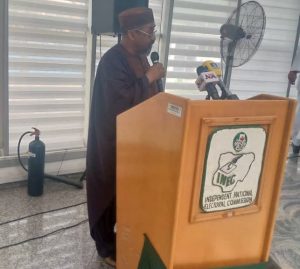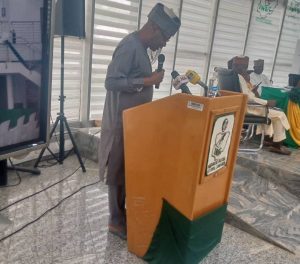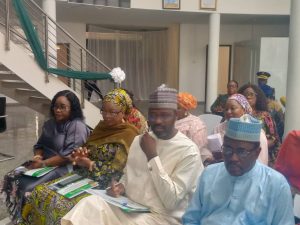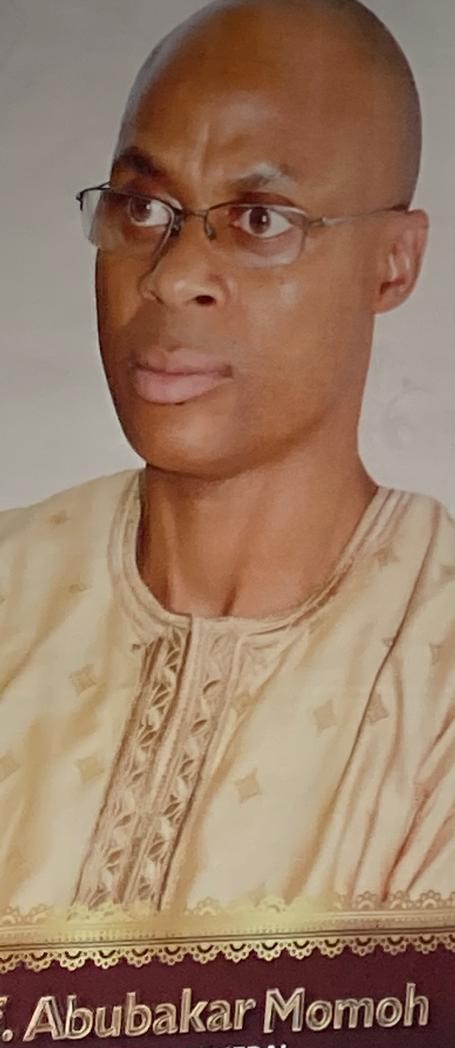It was another day of reflections on the life and times of Prof Abubakar Momoh, this time from the prism of perfecting elections in Nigeria through critical grooming of election personnel ahead of impending off cycle gubernatorial elections in Edo and Ondo states in Nigeria. It brings to two, the number of times Prof Momoh is the subject of memorialisation in one week. On June 3rd, 2024, CDD-West Africa memorialized Momoh and Dr Tajudeen AbdulRaheem.

DG TEI, Dr Idris speaking at the lecture
Momoh, a professor of Political Science at Lagos State University (LASU) was the Director-General of The Electoral Institute (TEI) when he died on May 2017 in Abuja. Taju who demonstrated a unique domestication of Pan-Africanism on both the campuses of Bayero University, Kano and Oxford University in the UK died in a car crash in Kenya on May 25th, 2009. He was a Director with the United Nations. The duo of Momoh and Taju have passed into the club of image breakers in the minds of friends, colleagues and comrades across the continent as far as the articulation of Pan-Africanism is concerned. They have been memorialized every year since their passage.
Dr. Sa’ad Umar Idris who succeeded as DG of The Electoral Institute, the organisers of today’s memorial, told his listeners that the Late Prof. Momoh championed professionalism and effective training of election personnel in his pragmatic approach to achieving the goals and objectives of the Commission. “Prof. Momoh has bequeathed to us a legacy of professional conduct in the electoral process and this legacy lives on”, he insisted, giving rigorous training and continuous capacity building of election personnel the pathway for the national election management body (INEC) to ensure that the electoral process is a product of utmost professionalism and integrity.

Dr. Kole Shettima
Africa Director of MacArthur Foundation, D. Kole Shettima, who served as Guest Lecturer on the topic “Achieving Professionalism Among Election Personnel Through Effective Training in Preparation for the Edo and Ondo States Governorship Elections” tied the personal and the social too tightly it is difficult to know which to prioritise or how to separate them. The personal was strictly on Momoh while the social was on to the issue of election personnel and conduct of credible elections but from a Momoh-seque perspective.
Kole started by breaking the joyous news that “Muhsin, his (Momoh) only biological son, graduated from Trent University, Canada, on June 5th, 2024.” But more than that, Kole added how the young man wants to be an academic just like his father. That is something that will gladden the late Prof Momoh’s minds over there where good people go when they die.
In setting the scene for the substantive topic/theme, Dr. Kole made remarks about Momoh which, for record purposes, might be best to capture in full. Below are the two paragraphs:
It wasn’t accidental that Abu died on that historic day, Nigeria’s Democracy Day. It’s difficult to argue that Abu’s passing on that day is not a divine affirmation and confirmation of his unique and true commitment to democracy. What a divine honor. Abu lived for democracy and egalitarian society. He seemed to be in a hurry to get a lot of things done. And he did in his short life. He was involved in designing the African Governance Architecture and Elections Benchmarking for the African Union. He served as an election observer to several African countries on behalf of the Economic Community of West African States and the African Union. He was also an Election Observer in some European countries. He devoted his academic life to teaching and raising new generation of social change champions. And he died in active service as the Director General of this Institute, TEI.

At the lecture
In his writings, Abu espoused the values of popular democracy. For example, in the article “Popular Struggles in Nigeria 1960-1982,” published by the African Journal of Political Science in 1996, he critiqued a neo-colonial Nigerian state incapable of fulfilling the people’s aspirations. Abu charged the peasants, workers, and students to locate their struggles in transforming the Nigerian state. In practice, he participated in democratic institutions. He demonstrated a commitment to popular institutions, being an active member of the Academic Staff Union of Universities and on the board of the Centre for Democracy and Development, Resource Centre for Human Rights and Civic Education, and Civil Society Legislative Advocacy Centre, among others. Abu was a renowned civil society leader.
Hence, Abu died on a day symbolic of his commitments, values, and passion.
In a society with difficulty in classifying people properly, these kinds of remarks are worth preserving Kole’s insight on an Abu Momoh thus serves a refreshing value added role. That role is putting it in our heads that there was an Abu Momoh and there are many more Abu Momohs who stood beyond easy classification typical in Nigeria such as Northerner, Southerner, Muslim, Christian, etc. Abu Momoh was every of these and more!
Meanwhile, Dr. kole’s lecture will follow shortly, albeit in an abridged form. It will be published for the reason that it complements the conversation at the presentation of Electoral Management Bodies in Nigeria Since 1958 last week in Abuja regarding the enormity of what it is to conduct elections in Nigeria. Public awareness of that enormity could help in moving closer to the possibility of credible elections in Nigeria.




























